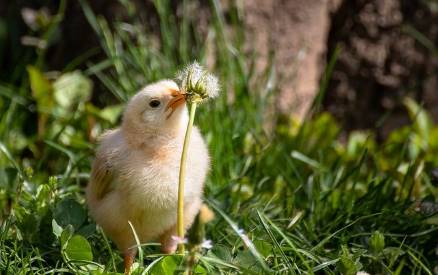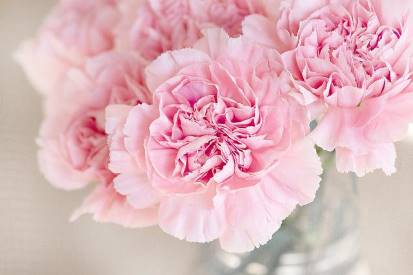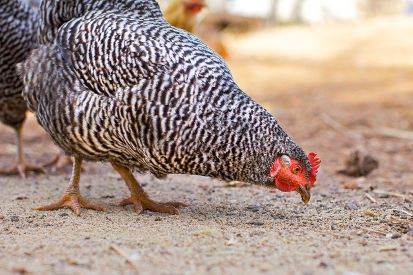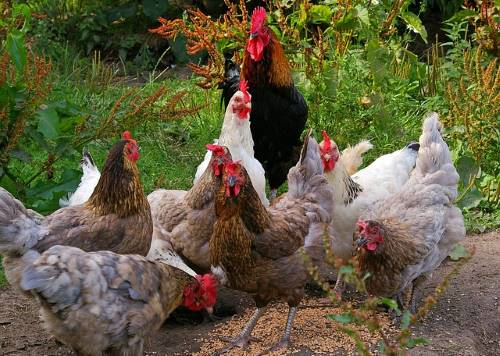Can chickens eat carnations? The answer, it turns out, is yes – chickens can eat carnations. Carnations are a safe flower for chickens to eat and can offer some benefits to your chicken’s diet.
But there are some things to watch out for when feeding chickens carnations. For example, carnations should be part of a healthy and balanced diet. You should also be aware of other poisonous flowers to chickens that may grow next to the carnations.
This article will cover the benefits of feeding chickens carnations, what to watch out for when doing so, and other information about this popular flower.

What are carnations?
Carnations are a type of flower that is often used in bouquets and other arrangements. They come in various colors, including white, pink, red, and purple.
Carnations have a long history and are mentioned in ancient texts from Greece and Rome. In the language of flowers, carnations represent love, fascination, and distinction. Carnations are also the birth flower for January.
Carnations are relatively easy to care for and can last for several weeks when displayed in a vase. With their long history and wide range of meanings, carnations are popular for gifts and decorations.
[ChickenAffiliate]
Can chickens eat carnations?

Any experienced gardener knows chickens are voracious eaters and will try to eat anything they can get their beaks on. This includes a wide variety of vegetables, fruits, and flowers.
So, can chickens eat carnations? The answer is yes, but with a few caveats. First, it’s important to ensure that the carnations are pesticide-free, as these chemicals can be harmful to chickens. Secondly, it’s best to offer carnations in moderation, as too many can cause an upset stomach.
However, carnations can provide a tasty treat for your chickens when fed in moderation and as part of a healthy diet.
The benefits of feeding chickens carnations
While chickens are often considered herbivores, they enjoy a wide variety of foods. In addition to seeds, grains, and insects, chickens also like to eat leafy greens, fruits, and even flowers.
Packed with nutrients
Carnations are a particularly good choice for chicken feed, as they are packed with nutrients and antioxidants. Carnations contain vitamins A, C, and E and calcium, phosphorus, and potassium.
These nutrients are essential for a chicken’s health and can help boost their immune system, improve their digestion, and increase their egg production.
In addition, the antioxidants in carnations can help to protect chickens from diseases and infections.
A colorful treat
Chickens are also drawn to the colorful petals of carnations. In the wild, chickens are attracted to brightly-colored fruits and flowers, which are usually a sign of high nutritional value.
So, not only do carnations taste good for chickens, but they also offer a visual treat. This can help to make your chickens’ diet more interesting and enjoyable.
Easy to eat
Plus, the petals are soft and easy to eat, making them a favorite among chicken owners. Carnations are a great option if you’re looking for a way to add some excitement to your chickens’ diet.
While carnations are not a necessary part of a chicken’s diet, they can certainly provide some added health benefits. So, if you’re looking for a way to give your chickens a little boost, consider adding some carnations to their feed.
What to watch out for when feeding carnations to chickens

While carnations are generally safe for chickens to eat, there are a few things you should keep in mind.
Pesticides
First, it’s important to ensure that the carnations are pesticide-free. Pesticides can be harmful to chickens and can even cause death.
If you’re not sure whether or not the carnations have been treated with pesticides, it’s best to proceed with caution and avoid feeding them to your chickens.
Upset stomachs
Secondly, it’s best to offer carnations in moderation, as too many can cause an upset stomach. When introducing carnations to your chickens’ diet, start with a small amount and see how they react.
If they seem to enjoy the carnations and have no adverse effects, you can gradually increase the amount you offer.
As with any new food, it’s always best to start slowly and observe your chickens closely when introducing carnations to their diet.
Carnations are a beautiful and nutritious addition to your chickens’ diet. However, it’s important to take a few precautions when feeding them to your feathered friends.
How often can chickens eat carnations?

Chickens can eat a wide variety of foods, including carnations. While the flowers are not necessary for the chicken’s diet, they can be a healthy treat high in vitamins and minerals.
There is no set rule for how often chickens can eat carnations, but giving them a few flowers per week is generally safe. If you choose to feed your chickens carnations, remove the stems and leaves first, as these can be toxic.
Once the flowers are stripped away, your chickens will enjoy nibbling on the petals and getting a nutritious snack.
Can baby chicks eat carnations?
Baby chicks are frequently fed a starter feed diet, providing them with all the essential nutrients they need to grow into healthy chickens. However, starter feed can be a little boring, and many people like to offer their chicks some variety by adding some fresh fruits and vegetables to their diets.
But can baby chicks eat carnations? While carnations are not toxic to chickens, they are not particularly nutritious and should not make up a significant part of their diet. Baby chicks need a diet high in protein and calcium to grow properly, and carnations are low in both of these nutrients.
For these reasons, it is best to avoid feeding carnations to baby chicks until they are older. If you want to treat your chicks to something special, try offering them some chopped greens or a few mealworms.
What other flowers can chickens eat?
While chickens have a fairly versatile diet, it’s essential to understand what types of plants and flowers are safe for their consumption. Carnations, for instance, are non-toxic to chickens and can be an occasional part of their diet. However, as we expand our understanding of what other plants chickens can eat, it’s crucial to take a closer look at other common flowers that may inhabit your yard or garden.
Dandelions
Dandelions are not only safe for chickens but are also incredibly beneficial. They are rich in vitamins A, C, and K, as well as calcium and potassium, all of which contribute to the overall health of chickens. The entire dandelion plant, including the flowers, leaves, and roots, can be consumed by chickens. They can be fed to chickens raw, or dried for use in the winter months when fresh greens are scarce.
Read More: Can Chickens Eat Dandelions? Unveiling A Golden Feast
Poison Ivy
Contrary to its effects on humans, poison ivy is actually safe for chickens to consume. Chickens are not affected by urushiol, the compound in poison ivy that causes itching and irritation in humans. This means they can safely eat the leaves, berries, and stems of this plant without experiencing any ill effects.
Interestingly, having your chickens eat poison ivy can even help control its growth in your yard, though you should still exercise caution to avoid contact with this plant yourself.
Read More: Can Chickens Eat Poison Ivy? Unraveling The Poultry Paradox
Marigolds
Marigolds are another excellent plant for chickens. These flowers are not only safe for chickens to eat but also provide several health benefits. Marigolds contain antioxidants and are known for their anti-inflammatory and antibacterial properties.
Some chicken keepers even believe that adding marigolds to chicken feed can help to intensify the yellow color of egg yolks. However, be sure to introduce marigolds into their diet gradually and monitor for any adverse reactions.
Read More: Can Chickens Eat Marigolds? 6 Surprising Benefits
Hibiscus
Hibiscus flowers and leaves can be safely consumed by chickens. They are rich in vitamin C and antioxidants, which can help support a chicken’s immune system. Like with other plants, hibiscus can be given to chickens fresh or dried. As a bonus, chickens tend to love the taste of hibiscus, so it can be a good treat to encourage them to forage.
Read More: Can Chickens Eat Hibiscus? Discover Health Benefits & More
Comfrey
Comfrey is another plant that can safely be incorporated into a chicken’s diet. It has high protein content and provides a good source of Vitamin B12, both of which are beneficial for the chickens’ health. However, it’s worth noting that comfrey should be fed to chickens in moderation due to the presence of certain compounds that, if consumed in large amounts over time, could potentially cause liver damage.
Read More: Can Chickens Eat Comfrey? 6 Excellent Benefits
What flowers are toxic for chickens?
Chickens are attracted to bright colors and sweet scents, making many flowers tempting snacks. However, some flowers can be toxic to chickens, causing everything from mild gastrointestinal distress to seizures and death.
Zinnias, marigolds, and sunflowers are all safe for chickens to eat, but daffodils, tulips, hyacinths, and lilies can be dangerous. If you have any of these flowers in your garden, ensure your chickens can’t reach them.
It’s also important to be aware that some plants can be toxic even if the flowers are safe. For example, azaleas and rhododendrons may have pretty blooms, but the rest of the plant is poisonous to chickens.
To be safe, it’s best to stick with flowers known to be safe for chickens. That way, you can enjoy watching your chickens peck at the petals without worrying about their health.
Can chickens eat carnations – final thoughts
Carnations are a safe and healthy treat for chickens. They offer a variety of nutrients that can help improve your chicken’s health, and they are also a colorful and tasty treat. Just be sure to offer them in moderation, as too many carnations can cause an upset stomach.
Related Articles:
